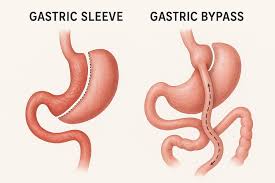
TL;DR:
- Gastric bypass is a weight loss surgery involving the creation of a small stomach pouch, directly connected to the small intestine, enhancing fullness and reducing calorie absorption.
- Roux-en-Y is a type of gastric bypass, named after the Y-shaped intestine post-surgery.
- Post-surgery, stomach capacity is reduced, impacting eating habits and hormonal levels, which can improve conditions like diabetes and sleep apnea.
- The surgery is typically aimed at individuals with a BMI over 40, or 35 with associated health issues.
- Preparation includes a pre-surgery diet, halting unhealthy habits, mental readiness, and dietary education.
- Laparoscopy is a common method for this surgery, ensuring recovery speed and minimal risk.
- Expected benefits include 60%-80% excess weight loss within two years and significant health improvements.
- Lifelong changes include adherence to dietary restrictions, regular checkups, and vitamin intake.
- Risks include infection, nutrient loss, and the need for lifelong care.
—
Have you been thinking about gastric bypass surgery but aren’t quite sure what it entails? At Nevada Surgical, we understand that the decision to undergo bariatric surgery can feel daunting. I’m Dr. Kent Sasse, and I’ve dedicated my career to guiding patients through this life-changing process with care and expertise. In this comprehensive guide, we’ll explore what gastric bypass is, how it works, and why it might be the right choice for you. Let’s dive into the details together and set you on a path toward a healthier future.
What is Gastric Bypass Surgery and How Does It Work?
What is Gastric Bypass Surgery?
Gastric bypass is a type of weight loss surgery. It changes how your stomach and intestine work. A small pouch is created from the stomach and connected to a lower part of the small intestine. This makes you feel full quicker and absorb fewer calories.
During the surgery, doctors make the stomach smaller. The new pouch holds less food than before. Food now skips most of the stomach and the top of the small intestine. This helps with weight loss by restricting how much you eat and absorbing fewer calories.
Difference Between Gastric Bypass and Roux-en-Y
There is no difference; Roux-en-Y is a type of gastric bypass. The name “Roux-en-Y” comes from the Y shape created by the small intestine during the surgery.
Body Changes After Gastric Bypass
After surgery, your stomach holds less food. The new pouch can only hold about half a cup or less. This leads to eating less and feeling full quickly. The surgery also changes hormones and can improve blood sugar levels. Many people lose significant weight and see improvements in conditions like diabetes and sleep apnea.
Who Can Get Gastric Bypass?
Candidates usually have a BMI over 40, or 35 with health issues like diabetes. Before surgery, you’ll try other weight loss methods like diet and exercise. You’ll need medical and mental health evaluations and nutritional guidance.
Preparing for Surgery
Preparation starts weeks before surgery. You’ll follow a special diet to shrink your liver, stop smoking, and limit alcohol. Mental readiness and dietary education are part of the preparation.
Surgery Tools and Methods
Most surgeries are done using small cuts in the belly through laparoscopy. This method reduces pain, speeds recovery, and minimizes risks. Tools used include staplers and cameras to guide and ensure accurate surgery.
Expected Results After Surgery
Most people lose 60% to 80% of excess weight within two years. Health issues like diabetes and sleep apnea often improve significantly. Some might regain a little weight if they do not adhere to lifestyle changes.
Comparing Gastric Bypass Options
Gastric bypass offers lasting weight loss by reducing both food intake and absorption. It often leads to more weight loss than other surgeries like the gastric sleeve. Medications may not provide the same long-term results.
Lifelong Changes After Surgery
After surgery, lifestyle changes are crucial. You must follow dietary rules, take vitamins forever, and attend regular checkups. Proper adherence ensures lasting health benefits and vitality.
Short- and Long-Term Risks
All surgeries have risks. Gastric bypass risks include infections, nutrient loss, and required lifelong care. Monitoring and support minimize these risks.
Conclusion
Gastric bypass is a transformative surgery that offers long-term weight loss and health improvements. With proper care and follow-up, you can achieve better health and a more fulfilling life.
##Conclusion
Considering gastric bypass surgery is a big step. I’ve covered how it changes your body and how the Roux-en-Y method works. The 30-minute rule helps avoid problems like dumping syndrome, and post-surgery, recovery requires patience and care. Be aware of the risks, from minor to long-term issues. Comparing it to the sleeve, each has pros and cons, including different risks years later. It’s crucial to weigh these choices carefully, with a focus on your health and quality of life. Trust in your decision can lead to a brighter, healthier future.
### Take the Next Step Towards a Healthier You
Are you considering gastric bypass surgery to transform your life? At [Nevada Surgical](https://forms.aweber.com/form/55/310012255.htm), we specialize in providing compassionate care and expert guidance throughout your weight loss journey. Click the link to connect with us and explore how we can help you achieve a healthier, more fulfilling life.